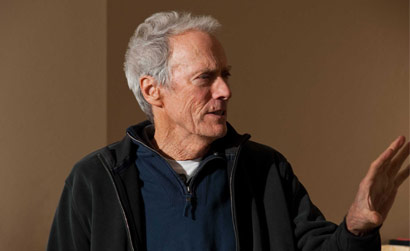
 Delving into hot topics like religion and politics may be a no-no in most conversations, but if you’re talking about, or rather to, Clint Eastwood, it’s pretty much anything goes, whether in his movies or face to face. Despite having just turned 80, Clint was in fighting form when taking on nosy journalists for this brisk exchange about his latest movie, the telepathic afterlife ghost tale Hereafter. Clint was quick to make it clear which kind of questions he was more than ready to reply to with a “cut,” and an assortment of pet peeves that can really make his day, including artsy stuff, stage mothers and anything about retirement.
Delving into hot topics like religion and politics may be a no-no in most conversations, but if you’re talking about, or rather to, Clint Eastwood, it’s pretty much anything goes, whether in his movies or face to face. Despite having just turned 80, Clint was in fighting form when taking on nosy journalists for this brisk exchange about his latest movie, the telepathic afterlife ghost tale Hereafter. Clint was quick to make it clear which kind of questions he was more than ready to reply to with a “cut,” and an assortment of pet peeves that can really make his day, including artsy stuff, stage mothers and anything about retirement.
This film project has gone through a lot of hands. How did you finally end up directing it? Let’s see…Stephen Spielberg called me one day. He said, “I have a script I’d love to send over to you,” and I said, “Fine.” And I read it and liked it. So I called him back and said, “I’ll do it.” I didn’t realize I was last on the list! However, I said I’ll do it. He was going through a minor divorce with Paramount, so it did become a little confusing as to where this would have its life. But I have a relationship with Warner [Bros.] so I said, “Let me take it to them.” And Warner’s liked it, so there we were.
What got you inspired about the story? Most religions seem to ponder the afterlife. But I thought this [story] was interesting, because it wasn’t really a religious project. It had a spirituality about it, but it wasn’t necessarily tied with any particular organized thought. Whether you believe in an afterlife or near-death experience or not, certainly everybody has thought about that at some point or another in time. It’s a fantasy that if there is anything like that out there, it would be just terrific! But that remains to be seen.
You wouldn’t say this is a religious movie, with its intermittent visits to what seems to be heaven? We just raise the questions. You pose the questions and they’re there. And then it’s up to the audience to meet you halfway and think about it, in terms of their own lives and what experiences they might have had. There may be some near-death experiences out there. It would be interesting to see what the answers are. But they’re going to have to be the ones to come up with those answers.
Have you ever had a near-death experience yourself? I think everybody has had something like that. I remember when I was very young, my dad was taking me into the surf on his shoulders, and I fell off. I can still remember today—even though I was only 4 or 5 years old—I can still remember the color of the water and everything, you know, as I was being washed around in the surf and before I popped to the surface again. But at that age, you don’t think too much. And then years later, when I was 21 years old, I was in a plane. We ditched the plane off the coast of northern California in the wintertime. And I must say, as I was going into shore, I kept thinking about my demise. But I also saw a light in the distance, and thought, “Somebody’s in there having a beer by a fireplace. And I just want to be in there! So I’m gonna make it.” And that was the determination. But there was no sense of fate out there, or anything like that. I don’t think you get a chance to think that, and when you get a chance to think like that, you’re usually OK.
Now about that tsunami, how did you make it look so real? Well, I like the idea of taking actual events and placing them into a fictional story. The tsunami four years ago out in the Pacific was one. And then the London bombings, of course. But the tsunami was very difficult to do. I kept having fantasies about huge hoses and thousands of gallons of water running down the streets. But I figured that would be prohibitive. In the old days, I suppose you would have done that on a set and turned a lot of water loose, but now you can do it with CGI. We did it in a lot of different places. Cecile was in a tank in London for nine hours and not getting out too much. She had to have a skin replacement afterwards. I took all the amateur footage of the tsunami that was taken when it was happening. So we took that to use as our influences when we got going. But I don’t want everyone to go see it with the expectation that they’re going to see two hours of flooding.



